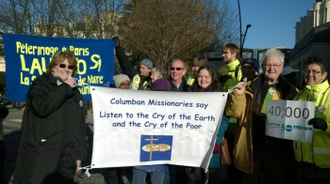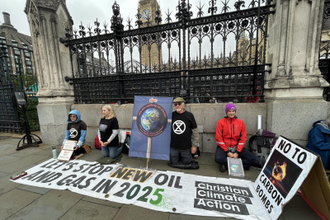Paris Blog 10: Reflecting on Columban Mission to Paris Climate Talks

As the Columban missionaries' delegation to the Paris UN climate talks leaves tomorrow, three questions are pertinent in this final blog: Why were we here? What reflections have struck us? How do we continue Columban mission on Climate Change after COP21?
First, we have continued action on Climate Change which has been part of Columban mission work for more than three decades. Second, we have supported people - particularly those most vulnerable to climate change impacts - who are crying out for climate justice. Greenhouse gases poured into the atmosphere are changing the Earth's natural cycles on land and in the sea and affecting the stability of the climate that has underpinned human development over the last 11,000 years. COP21 is the latest UN international initiative to address the problem and seek to promote sustainable development, and so we have been a witness to tackling human induced climate change here in Paris.
The penny is dropping. Last weekend's Global Climate March was the largest climate mobilisation in history, with over 785,000 people participating in 2,300 events in 175 countries. Church people were involved in - I'm sure - all of these, especially people who have long campaigned on justice and peace issues such as international debt, unjust trade, large scale mining and arms dealing. It is ten years since the National Justice and Peace Network in Britain set up an Environment Working Group, including Columban JPIC, which has made the connections between all these issues and the assault on the natural world, which is undermining lives and livelihoods of poor communities globally, and threatening all of humanity. We support the Filipino bishops who said back in 1988: "The assault on creation is sinful and contrary to the teachings of our faith".
I've felt really proud of my church here in Paris, with a solid presence of Vatican officials, clergy, Catholic organisations, religious orders and Catholic laity all calling for a strong climate agreement to keep global warming below 1.5 degrees celsius. The arrival in Paris of People's Pilgrimage walkers from around the world, and the Laudato Si' Westminster J&P cyclists from Britain, before the talks started was especially impressive. Two CAFOD cyclists brought news of 40,000 climate action signatures collected in England and Wales and delivered to Downing Street several days earlier. When Christiana Figueres, the executive secretary of the UN Framework Convention on Climate Change, received the faiths petitions last weekend she was actually tearful. She told us that such a lobby empowers those working on the COP21 agreement to be bold. The Global Catholic Climate Movement has brought together Catholic groups with the same mission and its website has become a common source for campaigning and resources. As our delegation leaves Paris tomorrow, another wave of Catholics is arriving with CAFOD and with the Bishops' Conference of the Philippines and others, to keep up the Catholic and faiths pressure on COP21 as it enters its second week. Negotiators will be working on amendments to the first draft of the agreement which was produced at the conclusion of the first week.
Yet, we have very aware of the power gap here between rich and poor countries. As some world leaders flew into Le Bourget last Monday to give their big speeches, the delegates from Niger and Burkina Faso were with us in the queue for a bus outside Le Bourget metro. Both were in the flowing desert robes that I remembered from working in Northern Nigeria in the early 1980s. Farmers from Niger, unable to make a living on their desertified farms, came south for work and some guarded our church compounds at night. Niger is so much worse off now environmentally with the rapid diminshment of Lake Chad which provided livelihoods for tens of thousands. Climate change is a life or death issue in these Sahelian countries but they do not have the big, well-resourced negotiating teams of the rich countries and the sheer clout to steer the COP21 agreement.
And we have been hearing that the big lobbyists for the corporate world are in town, with resources way beyond what non-governmental organisations (NGOs) can muster to influence negotiations. One negotiator told a meeting yesterday that for every NGO lobbyist there are around 200 from corporate and economic bodies. When the first draft of the COP21 document appeared yesterday the indigenous people's lobby immediately objected to the proposed removal of language pertaining to both the rights of Indigenous Peoples and Human Rights from Article 2.2 of the draft Paris Accord. The UK and the EU were key players in this removal, and many of us are deeply ashamed, although we can only guess what lay behind it. We have met some of the indigenous communities here at COP21. They are very noticeable with their feathered headgear and painted faces, but also because they talk bucketloads of common sense about sustainability and the need to protect rainforests from extractive industries. At present, the rights of Indigenous Peoples are only reflected within the preamble - which is purely aspirational text, and not legally binding or enforceable in any way. No wonder, some of the indigenous people in Paris paddled down the River Seine in canoes today to draw attention to their frustration and to their recommendations.o
Another aspect of concern for me in Paris has been the lack of wildlife. Apart from pigeons around the Pompidou Centre and seagulls I have never seen so many gardens and parks without creatures running up trees and birds flying above our heads. Even at Clichy Batignolles eco-district of Paris I believe I saw only two ducks. There have been marvelous exhibitions in central Paris about such things as waste management and low carbon transport in the future, but life will surely be impoverished if human society has edged other species out of our living environment. French landscape architects apparently value order and symmetry over ecology, and avian diversity has suffered. Birds are messengers, signalling the existing danger global warming and environmental degradation poses to species and habitats worldwide. Columban missionary Sean McDonagh talks about the diversity of species demonstrating the great beauty and creativity of God the Creator, and I for one have missed this richness of life in Paris.
Yet, we are hearing every day about steps in a sustainable direction, prompted by COP21.
Google announced this week that it has purchased additional renewable energy capacity to power their data centers, which enable the 1.7 billion Google users worldwide to surf the web. Uruguay and Norway are on their way to using 100% renewable energy. Climate change is finally on nearly everybody's agenda and a global renewable energy revolution is under way. Hopefully, it will develop fast enough.
In this second week of the climate talks, big voices, particularly Naomi Klein and Vandana Shiva, have arrived to push the case for a strong agreement with emphasis on climate justice and supporting vulnerable countries and communities. Climate campaigners such as Filipino People's Pilgrim Yeb Sano continue to be inspirational. On the Catholic front, Cardinal Peter Turkson, head of the Pontifical Council for Justice and Peace, is now here.
Somebody who is a powerful presence in spirit is Pope Francis. His support for climate action has boosted the spirits of negotiators and scientists, as well as climate campaigners. An article in the New York Times at the weekend suggested that COP21 has something unique backing it - "the power of Pope Francis' encyclical earlier this year calling global warming a moral issue and an even more energised interfaith community". The article suggested that in the first five days of climate negotiations, the fasting, praying, handing over of huge petitions and talking to the media by interfaith activists has been noted by negotiators. The Columban delegation feels blessed to have played a role in that, and to have brought to forums here such initiatives as the Livesimply Parish Awards and Columban resources on Laudato Si' and Seasons of Creation.
We have also underlined in the Catholic forums Fr Sean McDonagh's call for a three-year Synod on Creation, developing the 'Care for Creation' ministry of the Catholic Church and building on Laudato Si'. And it is absolutely clear that new 'Creation Care' structures are needed throughout international and national Church structures to work with hierarchy on environmental issues. Catholic Earthcare Australia offers a model to consider. An area of development in England and Wales is putting more resources towards Justice and Peace workers, whose mission links issues of justice, peace and climate change.
What can we still do re COP21? Use social media to keep the UN Conference on Climate Change in the public eye this week, and keep praying. If you have not already done so, sign the Global Catholic Climate petition. Last week the Catholic lobby in Paris presented 840,000 signatures to UN Secretary Christiana Figueres in Paris, with Cardinal Hummes representing the Catholic movement. But it has just been announced that French President Francois Hollande will also receive the faith petitions, including the Catholic ones, on Thursday 10 December. The French government is the president of the COP21 conference, so this event with President Hollande is of huge symbolic value. Wouldn't it be great if the Catholic signatures could reach one million over the next few days!
Sign up at: http://catholicclimatemovement.global/petition/toolkit/
All 10 Paris blogs by Ellen Teague are available on twitter #columbans4climatejustice


















